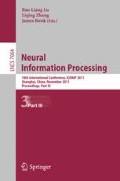Abstract
Classifying web queries into predefined target categories, also known as web query classification, is important to improve search relevance and online advertising. Web queries are however typically short, ambiguous and in constant flux. Moreover, target categories often lack standard taxonomies and precise semantic descriptions. These challenges make the web query classification task a non-trivial problem. In this paper, we present two complementary approaches for the web query classification task. First is the enrichment method that uses the World Wide Web (WWW) to enrich target categories and further models the web query classification as a search problem. Our second approach, the reductionist approach, works by reducing web queries to few central tokens. We evaluate the two approaches based on few thousands human labeled local and non-local web queries. From our study, we find the two approaches to be complementary to each other as the reductionist approach exhibits high precision but low recall, whereas the enrichment method exhibits high recall but low precision.
This work was partially supported by a grant from the Research Grants Council of the Hong Kong Special Administrative Region, China (Project No. CUHK 413210).
Access this chapter
Tax calculation will be finalised at checkout
Purchases are for personal use only
Preview
Unable to display preview. Download preview PDF.
References
Baeza-Yates, R., Castillo, C.: Relating web structure and user search behavior. In: 10th World Wide Web Conference, Hong Kong, pp. 1–2 (2001)
Shen, D., Pan, R., Sun, J.-T., Pan, J.J., Wu, K., Yin, J., Yang, Q.: Query enrichment for web-query classification. ACM Trans. Inf. Syst. 24, 320–352 (2006)
Broder, A.Z., Fontoura, M., Gabrilovich, E., Joshi, A., Josifovski, V., Zhang, T.: Robust classification of rare queries using Web knowledge. In: Proceedings of the 30th annual international ACM SIGIR Conference on Research and Development in Information Retrieval, Amsterdam, The Netherlands, pp. 231–238 (2007)
Shen, D., Sun, J.T., Yang, Q., Chen, Z.: Building bridges for Web query classification. In: Proceedings of the 29th Annual International ACM SIGIR Conference on Research and Development in Information Retrieval, Seattle, WA, USA, pp. 131–138 (2006)
Shen, D., Pan, R., Sun, J.-T., Pan, J.J., Wu, K., Yin, J., Yang, Q.: Q2c@ust: our winning solution to query classification in kddcup 2005. ACM SIGKDD Explorations Newsletter 7, 100–110 (2005)
Beitzel, S.M., Jensen, E.C., Frieder, O., Grossman, D., Lewis, D.D., Chowdhury, A., Kolcz, A.: Automatic Web query classification using labeled and unlabeled training data. In: Proceedings of the 28th Annual International ACM SIGIR Conference on Research and Development in Information Retrieval, Salvador, Brazil, pp. 581–582 (2005)
Diemert, E., Vandelle, G.: Unsupervised query categorization using automatically-built concept graphs. In: Proceedings of the 18th International Conference on World Wide Web, Madrid, Spain, pp. 461–470 (2009)
Wen, J.-R., Jian-Yun Nie, H.J.Z.: Query clustering using user logs. ACM Trans. Inf. Syst. 20(1), 59–81 (2002)
Beitzel, S.M., Jensen, E.C., Lewis, D.D., Chowdhury, A., Frieder, O.: Automatic classification of Web queries using very large unlabeled query logs. ACM Trans. Inf. 25(2) (April 2007)
Howe, J.: The rise of crowdsourcing. Wired 14(6) (2006)
Alonso, O., Lease, M.: Crowdsourcing 101: Putting the “wisdom of the crowd” to work for you. In: Tutorials of the 4th ACM International Conference on Web Search and Data Mining (2011)
Agrawal, R.J., Shanahan, J.G.: Location disambiguation in local searches using gradient boosted decision trees. In: Proceedings of the 18th SIGSPATIAL International Conference on Advances in Geographic Information Systems, GIS 2010, pp. 129–136. ACM, San Jose (2010)
Dzeroski, S., Zenko, B.: Is combining classifiers better than selecting the best one. In: Proceedings of the Nineteenth International Conference on Machine Learning, ICML 2002, pp. 123–130. Morgan Kaufmann Publishers Inc., San Francisco (2002)
Author information
Authors and Affiliations
Editor information
Editors and Affiliations
Rights and permissions
Copyright information
© 2011 Springer-Verlag Berlin Heidelberg
About this paper
Cite this paper
Agrawal, R., Yu, X., King, I., Zajac, R. (2011). Enrichment and Reductionism: Two Approaches for Web Query Classification. In: Lu, BL., Zhang, L., Kwok, J. (eds) Neural Information Processing. ICONIP 2011. Lecture Notes in Computer Science, vol 7064. Springer, Berlin, Heidelberg. https://doi.org/10.1007/978-3-642-24965-5_17
Download citation
DOI: https://doi.org/10.1007/978-3-642-24965-5_17
Publisher Name: Springer, Berlin, Heidelberg
Print ISBN: 978-3-642-24964-8
Online ISBN: 978-3-642-24965-5
eBook Packages: Computer ScienceComputer Science (R0)

